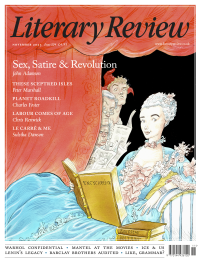Nigel Andrew
Canada Burning
Fire Weather: A True Story from a Hotter World
By John Vaillant
Sceptre 432pp £25
Does the name Fort McMurray mean anything to you? I must admit that, until I read this book, I had only a vague idea of the place as a remote mining town somewhere in northern Canada. What I now know is that Fort McMurray is a large, sprawling urban area (not technically a city but it ought to be one) in the boreal forest of Alberta, and that its mining activities – extracting oil from bitumen – are on such a gigantic scale that they can be seen from six thousand miles up in space, at which height they are the only visible signs of human industrial activity. This whole vast area was consumed, in May 2016, by a wildfire the like of which had never been seen before in an urban setting. It spread at terrifying speed, burned for months, created its own weather and achieved such destructive force that it could make a house and all its contents vaporise in five minutes, leaving behind only a hole in the ground and a few scraps. The fire destroyed almost everything in and around the town, burned more than two thousand square miles of forest and was the costliest natural disaster in North American history. Miraculously, no one died: nearly ninety thousand people managed to escape by car along traffic-choked roads, with fire raging all around them, smoke reducing visibility to almost nothing and the air full of blazing embers.
The dramatic story of the Fort McMurray fire is vividly told in John Vaillant’s impressive new book. Before he gets down to the events of 2016, he relates the history of the area, back to the days of the Hudson’s Bay Company, and of the exploitation of bitumen, initially

Sign Up to our newsletter
Receive free articles, highlights from the archive, news, details of prizes, and much more.@Lit_Review
Follow Literary Review on Twitter
Twitter Feed
Though Jean-Michel Basquiat was a sensation in his lifetime, it was thirty years after his death that one of his pieces fetched a record price of $110.5 million.
Stephen Smith explores the artist's starry afterlife.
Stephen Smith - Paint Fast, Die Young
Stephen Smith: Paint Fast, Die Young - Jean-Michel Basquiat: The Making of an Icon by Doug Woodham
literaryreview.co.uk
15th-century news transmission was a slow business, reliant on horses and ships. As the centuries passed, though, mass newspapers and faster transport sped things up.
John Adamson examines how this evolution changed Europe.
John Adamson - Hold the Front Page
John Adamson: Hold the Front Page - The Great Exchange: Making the News in Early Modern Europe by Joad Raymond Wren
literaryreview.co.uk
"Every page of "Killing the Dead" bursts with fresh insights and deliciously gory details. And, like all the best vampires, it’ll come back to haunt you long after you think you’re done."
✍️My review of John Blair's new book for @Lit_Review
Alexander Lee - Dead Men Walking
Alexander Lee: Dead Men Walking - Killing the Dead: Vampire Epidemics from Mesopotamia to the New World by John Blair
literaryreview.co.uk